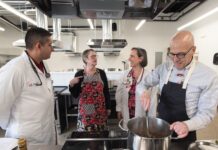
UofL’s Teaching Innovation Learning Lab (TILL) recently awarded seven faculty with the 2022 TILL Teaching Innovation Award. The award recognizes teaching excellence among UofL faculty and offers individual recognition to instructors who explore new methods for fostering learning and student success.
The 2022 award recipients are Danielle Franco, associate professor in chemistry; David Johnson, assistant professor in health management and systems sciences; Daniela Terson de Paleville, associate professor in health and sport sciences; and a group submission by Natalie Christian, Rachel Pigg, Mikus Abolins-Abols and Jeffery Masters in biology.
Now in its second year, the TILL Teaching Innovation Award grants winners $1,000 and an invitation to share their work at the annual Celebration of Teaching and Learning conference.
“I continue to be impressed by the innovative methods our faculty are investigating to help students learn,” said Marie Brown, interim associate provost for teaching and innovation. “At the Delphi Center, we see first hand how much work instructors put into designing their courses. We want to recognize those who are exploring new ways to meet student needs.”
“By its nature, teaching is an iterative process,” Christian added. “We always learn from our successes and our failures in the classroom, and can use that information to make our courses better.”
Christian was recognized with colleagues Abolins-Abols, Masters and Pigg for their work restructuring the intro biology curriculum to include course-based undergraduate research experiences.
For Terson de Paleville, who won for designing active learning course activities centered around the flipped classroom and team-based assignments, teaching innovation is critical to creating an inclusive classroom.
“One size does not fit all in education,” she said. “The same material can be presented in many ways, or even better, can be discovered and understood by students of all ages, cultural, ethnic, and previous academic backgrounds, students with disabilities, neurotypical and neurodiverse students.”
Franco found that going the extra mile to provide students with new ways to engage with course material, such as the virtual reality simulations she created for her chemistry course, made the concepts more accessible to students.
“The most rewarding part of implementing this innovation is the feedback from students,” she said. “They thought that the simulations were very engaging and helpful.”
One of the criteria used by the award selection committee is the potential for other instructors to adopt the teaching strategy across diverse academic disciplines. Johnson won for such an innovation, the development of a versatile assignment and evaluation rubric using the principles of the Paul-Elder model of critical thinking.
“Our hope is that by celebrating innovation in teaching faculty across campus will be empowered to explore new strategies in their own courses,” Brown said. “It’s an exciting time for instructional innovation, and I look forward to seeing what strategies, tools and practices our talented faculty implement in the year ahead.”
More information about the winning TILL Teaching Innovation Award projects is available online.
Story written by Brooke Whitaker, marketing manager at UofL’s Delphi Center.































